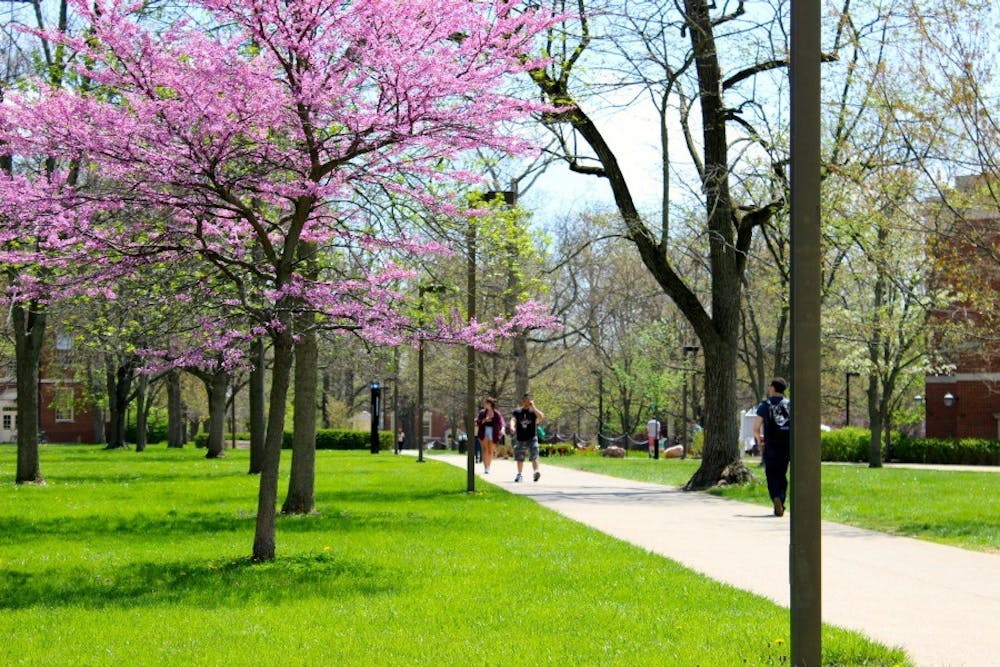By Nadya Korytnikova, For The Miami Student
It seemed just like another dull day of high school in Chengdu, China for 18-year-old 'Amanda' Yang, until she came back to her room and found on her desk something that had the power to change her life forever. It was a long awaited letter from the Chinese government, indicating whether Amanda passed the required testing for the full-time scholarship that would allow her to study at a university in the United States.
"The moment I saw this letter, I completely froze," Amanda said. "I have been waiting for this letter for such a long time, and when I finally got it, I did not want to open it. I wanted to know whether I passed or not for the scholarship, but I really thought that there is no way I passed. I just decided to read the letter the next day."
That day, Amanda was too scared to face the realization of a rejection that could await her inside the envelope. But despite her decision to postpone opening the letter, a moment later she unsealed the envelope and read the government's decision.
Being a child of two full-time working parents, Amanda was different from other kids in Chengdu.
"My friends always had moms waiting for them from school," she said. "It always seemed so unusual and kind of weird to me, because by the time I came back home, my parents would still be at work."
Her father, Michael Yang, owns a local Chinese restaurant, and her mother, Lisa Yang, used to work as an accountant in a management company, until five years ago, doctors found a tumor in her stomach and needed to perform surgery.
Since the surgery, Mrs. Yang feels a lot healthier, but not well enough to get back to work. The reduced family income put a huge financial weight on Mr. Yang's shoulders, and Amanda promised herself to help her father keep the family afloat.
"When I was 13 years old, I noticed that my father spent much more time working," Amanda said. "I felt sorry for my dad who had to work 'till night. I really wanted to find a job to help him, but no one would employ a child."
Amanda's aim to help her father was not just a fleeting desire of a small child to grow up - at age 16, she volunteered to be a part-time server in her father's restaurant, which saved him a significant amount of money.
But she soon quit the job due to an intense school schedule, which included seven different classes each day. In addition to her desire to succeed in school, Amanda set a new goal for herself: to get accepted into a university in the United States.
With her dream to study overseas, she was no different from most of her classmates, who also planned to study at an American university. The educational system in U.S. is considered to be better than China's, and graduate students of American universities often have more opportunities to find jobs in China than Chinese graduates.
However, unlike her classmates, in order to study abroad, Amanda would have to rely on the financial help of the Chinese government rather than her father's money.
"I thought that studying in America would be nearly impossible for me," she said. "My family is not poor, but certainly not rich enough to provide me with money to study abroad for the four years. The only way for me was to get money from the government. I would have to pass a special testing, and if my results are good enough, I might get scholarship from the government."
Despite her doubts, Amanda dedicated herself to studying, took the test and waited impatiently for her results.
The moment Amanda opened the letter, her eyes immediately ran through the first few words.
"I wasn't brave enough to read the full letter," she said. "I just saw the words 'Congratulations,' 'approved,' and I was already happy. I read the letter carefully again later to make sure that I was approved to receive the money."
Now, Amanda is a first-year at Miami University. She gets along with students in her dorm and enjoys going out with her classmates, but she spends most of her time in her room studying.
Though dominated by her roommate's posters, Amanda's room still closely resembles her room in Chengdu. The soft light of Chinese lamps, fading smell of breakfast noodles and a picture of her parents holding a smiling toddler take Amanda back home, where her parents have high hopes and expectations for their daughter, the first person in the family to study in the United States.
Even though Amanda is currently a part of the Miami community, the difference in social status makes her feel as a pariah among other Chinese students at the school, whose wealthy parents are capable of paying a full college tuition.
She often skips parties organized by the Chinese Association because she feels that her "outfit does not match with the outfit of other Chinese students."
But her friends say that the social barrier only exists in Amanda's mind, and that other Chinese students don't care about the lack of money in her pocket.
"Amanda worries too much about what people think about her," said Siyu Huang, one of Amanda's friends at Miami. "None of the Chinese students care about her outfit. Everyone knowns she is a very good person."
As the academic year has passed by, Amanda has begun to realize that she might have overestimated the importance of the socioeconomic gap between herself and other students.
"Now [that] I am more comfortable with people around me, I think my friends were right that I think too much about this whole money situation," said Amanda. "I hope I will be more confident in the future."

